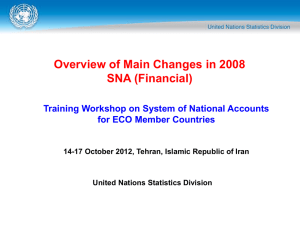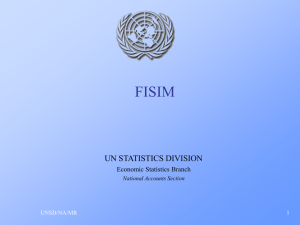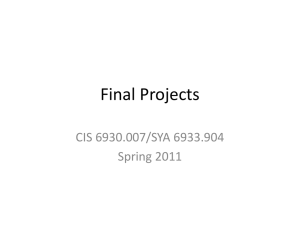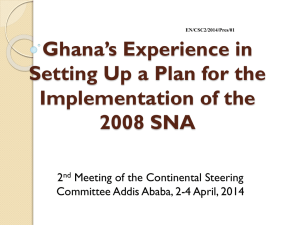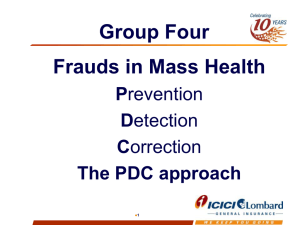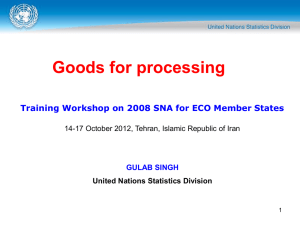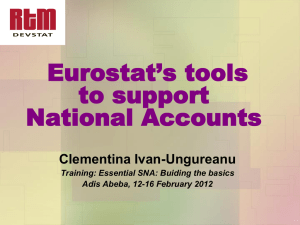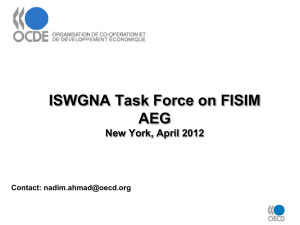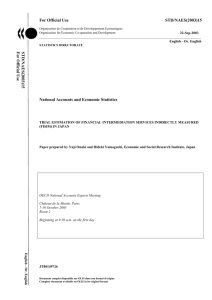8. Overview of Main Changes in 2008 SNA (Financial)
advertisement
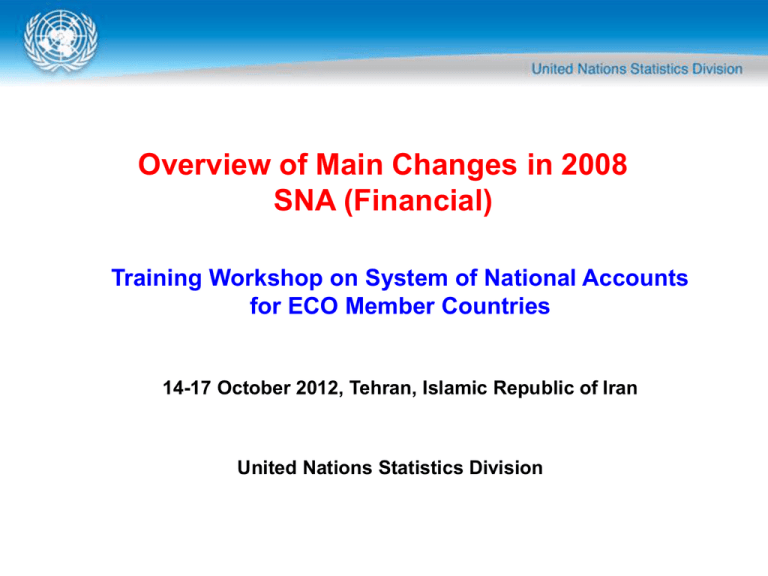
Overview of Main Changes in 2008 SNA (Financial) Training Workshop on System of National Accounts for ECO Member Countries 14-17 October 2012, Tehran, Islamic Republic of Iran United Nations Statistics Division Outline of Presentation Changes from 1993 SNA 2008 SNA Changes affecting GDP 2 Changes from 1993 SNA Grouped as follows: 1. Further specifications of statistical units and revisions in institutional sectoring 2. Further specifications of scope of transactions including the production boundary 3. Further refinement of treatment and definition of financial instruments and assets 3 1. Further specifications of statistical units and revisions in institutional sectoring Holding company (para 4.54) Holds the assets of subsidiary corporations but does not undertake any management activities (Section K class 6420 of the ISIC Rev. 4) Therefore, produces only a financial service 2008 SNA recommendation • Always allocated to the financial corporations sector 1993 SNA recommendation • Allocated to the institutional sector in which the main activity of the group of subsidiaries is concentrated 4 1. Further specifications of statistical units and revisions in institutional sectoring Head office (para 4.53) Activities, as defined in section M class 7010 of the ISIC Rev. 4, include • Overseeing and managing of other units of enterprise • Undertaking the strategic or organizational planning and decision making role of the enterprise • Exercising operational control and manage the day-to-day operations of their related units Therefore, produces non-financial or financial services depending upon the nature of production of its subsidiaries 2008 SNA recommendation • Allocated to non-financial corporations sector unless • all or most of its subsidiaries are financial corporations, in which case it is treated by convention as a financial auxiliary in the financial corporations sector No explicit guidance for treatment in the 1993 SNA 5 1. Further specifications of statistical units and revisions in institutional sectoring Sub-sectoring of the financial corporations sector revised (para 4.98-4.116) 9 sub-sectors to reflect new developments in financial services, markets and instrument i. Central Bank (S121) ii. Deposit-taking corporations except the central bank (S122) iii. Money market funds (MMFs) (S123) iv. Non-MMF investment funds (S124) v. Other financial intermediaries except insurance corporations and pension funds (ICPFs) (S125) vi. Financial auxiliaries (S126) vii. Captive financial institutions and money lenders (S127) viii. Insurance corporations (ICs) (S128) ix. Pension funds (PFs) (S129) 6 1. Further specifications of statistical units and revisions in institutional sectoring Definition of financial services enlarged (para 4.98, 6.158, 6.165) 1993 SNA recognised only financial intermediation services 2008 SNA enlarges definition of financial services to give due weight to the increase in financial services other than the financial intermediation, specifically financial risk management and liquidity transformation Financial services provided by money lenders recognised • Include services provided by unincorporated enterprises 7 2. Further specifications of scope of transactions including the production boundary Method for calculating financial intermediation services indirectly measured (FISIM) is refined (para 6.163-6.165) By convention the 2008 SNA recommends that • FISIM applies only to loans and deposits and • only when those loans and deposits are provided by, or deposited with, financial institutions The 2008 SNA calculates the output of FISIM on loans (VL) and deposits (VD) only, using a reference rate (rr) Assuming that these loans and deposits attract interest rates of rL and rD respectively, the output of FISIM should be calculated as (rL - rr) VL + (rr rD) VD 8 2. Further specifications of scope of transactions including the production boundary Method for calculating financial intermediation services indirectly measured (FISIM) is refined (para 6.163-6.165) The 2008 SNA recommends that output of FISIM should be allocated between users (lenders and borrowers) treating the allocated amount either as intermediate consumption or final consumption or exports The 1993 SNA • Calculated FISIM as the difference between property income receivable and interest payable • Excluded from property income receivable that part which was earned using investment of own funds • Gave countries choice to continue to use the convention to allocate whole of FISIM to intermediate consumption of a notional industry 9 2. Further specifications of scope of transactions including the production boundary Output of central bank clarified (para 6.151-6.156) Services produced by the central bank • Financial intermediation • Monetary policy services • Supervisory services - overseeing financial corporations Separate establishments should be identified Financial intermediation services represent market production Monetary policy services represent non-market production Supervisory services • Borderline case • Market or non-market services depending on whether explicit fees are charged that are sufficient to cover the costs of providing such services 1993 SNA recommended that the services of central bank be measured on basis of receipts from fees, commissions, and FISIM • Resulted in unusually large positive or negative output 10 2. Further specifications of scope of transactions including the production boundary Improved method for calculating output of non-life insurance services (para 6.184-6.190, 17.13-17.42) Catastrophic events generate massive claims on non-life insurance corporations In such cases the output of the insurance activity estimated using the basic algorithm of the 1993 SNA anchored on the balance of premiums and claims (on accrual basis) could be extremely volatile (even negative) The 2008 SNA recommendation • Output of non-life insurance activity should be calculated using adjusted claims and adjusted premiums supplements • Net premiums receivable and actual claims may no longer be equal for each period 11 11 2. Further specifications of scope of transactions including the production boundary Improved method for calculating output of non-life insurance services (para 6.184-6.190, 17.13-17.42) 3 methods to compute non-life insurance output • Expectations approach • Accounting approach • Cost approach Expectations approach • Ex-ante model • Insurers consider expectation of claims and premium supplements in setting premiums • Expected margin (premiums earned + expected premium supplements – expected claims) provides better measure of output than 1993 SNA ex-post formula 12 2. Further specifications of scope of transactions including the production boundary Improved method for calculating output of non-life insurance services (para 6.184-6.190, 17.13-17.42) Accounting approach • Output = premiums earned + premium supplements – adjusted claims incurred • Adjusted claims incurred determined by using claims incurred plus changes in equalization provisions and, if necessary, changes to own funds Cost approach • Use if data are not available to apply the expectations and accounting approaches • Output is estimated as sum of costs (including intermediate costs, labour and capital inputs) plus allowance for “normal profit” 13 3. Further refinement of treatment and definition of financial instruments and assets To reflect the innovations in the financial market and also maintain its relevance in a time of rapid economic and institutional change the financial asset classification has been changed in the 2008 SNA (Chapter 11) • • • • • • • • Monetary gold and Special Drawing Rights (SDRs) • Monetary gold • SDRs Currency and deposits • Currency • Transferable deposits • Other deposits Debt securities • Short-term • Long-term Loans • Short-term • Long-term Equity and investment fund shares • Equity (listed/unlisted/other shares) • Investment fund shares/units Insurance, pension and standardized guarantee schemes • Non-life insurance technical reserves • Life insurance and annuity entitlements • Pension entitlements Financial derivatives and employee stock options • Financial derivatives (options/forwards) • Employee stock options Other accounts receivable/payable • Trade credits and advances • Other accounts receivable/payable 14 3. Further refinement of treatment and definition of financial instruments and assets Treatment of non-performing loans elaborated (para 11.130, 13.66-13.68) Non-performing loan – loan on which payments of interest and/or principal are past due by 90 days or more, or interest payments equal to 90 days or more have been capitalized, refinanced, or delayed by agreement, or payments are less than 90 days overdue, but there are other good reasons (such as a debtor filing for bankruptcy) to doubt that payments will be made in full 2008 SNA recommendation • Non-performing loans should continue to be recorded at nominal value in main accounts • Interest should be shown accruing until a loan is repaid or principal is written off by mutual agreement 15 3. Further refinement of treatment and definition of financial instruments and assets Treatment of non-performing loans elaborated (para 11.130, 13.66-13.68) 2 memorandum items • Nominal value of loans deemed to be non-performing • Market equivalent value of these loans Interest receivable on non-performing loans should be shown as “of which” item 1993 SNA did not provide criteria for recording of non-performing loans 16 3. Further refinement of treatment and definition of financial instruments and assets Distinction between financial and operating leasing (para 17.301-17.309) 2008 SNA • Distinction according to whether the lessee should be regarded as the economic owner of the asset or not 1993 SNA • Distinction was interpreted to be based on the length of the time of lease 17 3. Further refinement of treatment and definition of financial instruments and assets Changes in recording pension entitlements (para 17.116-17.206) 2008 SNA • Recognizes that employment-related pension entitlements are contractual engagements, in that they are expected or likely to be enforceable • Therefore, they should be recognized as households’ assets, irrespective of the fact that segregated schemes’ assets exist or not, and of the fact that the employer may have recorded an associated liability entry in his balance sheet or not • Consequently recommends recording of the liabilities of employment-related pension schemes, regardless of whether funding to meet them exists or not Pensions provided by government via social security • Division between which pensions are provided by social security and which by other employment-related schemes varies considerably from country to country • Countries have some flexibility to deviate from this rule in the set of standard tables However, the full range of information required for a comprehensive analysis of pensions is recommended to be provided in a supplementary table (Table 17.10, 2008 SNA) that shows the liabilities and associated flows of all private and government pension schemes, whether funded or unfunded and including social security 18 2008 SNA Changes affecting GDP 19 New way of measuring FISIM Measurement Measurement relies only on interest receivable on loans and interest payable on deposits, ignoring all other investment incomes Loans made from own funds are also treated as generating output FISIM to be allocated between users Impact Depending on the structure of financial instruments, output of FISIM could increase For example, loans made from own funds will increase FISIM Money lenders output recognized FISIM allocated to final demand and exports will increase GDP 20 Unfunded pension funds Imputation There is a cost to administering pension schemes, including nonautonomous and unfunded ones Impact Increases household consumption and possibly exports Increases GDP Output to be determined using sum of costs, consumed by employees holding the pension entitlements 21 Thank You 22
